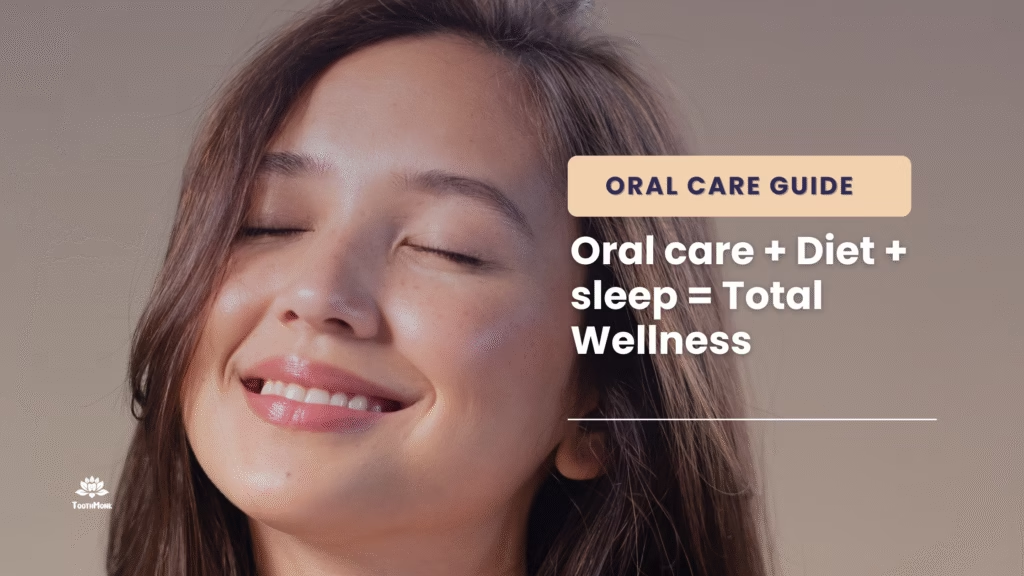
The little warning that changed Raj’s life …
Raj was a 34‑year‑old product manager who prided himself on smashing deadlines, not on visiting dentists.
One Monday morning he noticed his gums bleeding while brushing. He shrugged it off, until that same evening a sharp pain shot through his chest during a run. The doctor in the emergency room didn’t find a heart attack, but his blood markers showed stubborn inflammation. The cardiologist’s first question surprised him:
“When was your last dental check‑up?”
That question sent Raj down a rabbit hole of research, and eventually to Toothmonk, where he rebuilt his daily routine around three simple pillars: oral care, diet, and sleep.
This blog unpacks the science Raj discovered, so you can weave the same pillars into your day and feel the compounding benefits.
1. Your Mouth: The Front Door to Total Wellness
Dentists often call the mouth a “window to the body.” Research in the Journal of Clinical Periodontology found that advanced gum disease (periodontitis) raises cardiovascular risk up to three‑fold.
How? Inflamed gums allow oral bacteria to slip into the bloodstream, where they trigger arterial plaque and systemic inflammation.
Key takeaway: Brushing and flossing aren’t cosmetic chores; they are your first line of immune defence.
2. Diet: What You Eat Feeds Your Mouth First
Raj thought diet influenced only his waistline. Then he learned that sugar fuels the “bad” bacteria that spark cavities and gum inflammation. A large meta‑analysis in the Journal of Dental Research confirmed that diets rich in fibre, antioxidants, and Vitamin D correlate with significantly lower plaque scores.
- Swap : fizzy drinks ➞ sparkling water + lime
- Add : crunchy veggies (celery, carrots) that scrub while you chew
- Balance : calcium + Vitamin D for enamel strength
3. Sleep: The Overnight Repair Crew
Bleeding gums kept Raj awake, but he didn’t realise sleep loss was making his gums worse. Studies in Sleep Medicine Reviews show that getting fewer than 6 hours of quality sleep increases inflammatory markers and weakens the body’s response to oral pathogens Poor sleep also raises cortisol, leading to night time teeth‑grinding (bruxism) and gum recession.
Pro‑Sleep Oral Hacks
- Switch to a desensitising toothpaste after dinner, minty freshness without late‑night sugar.
- Keep a fluoride mouth‑rinse
If you clench, talk to your dentist about a nighttime guard.
4. The Wellness Domino Effect
Skipped habit
Forgot to floss
Sugary snack binge
Doom‑scroll past midnight
Immediate oral impact
Plaque builds overnight
Acidic pH < 5.5
Saliva dries
Systemic fallout
systemic inflammation
Insulin spike → fatigue
Weakened immunity next day
Notice how one weak link drags the others down. Conversely, one strong habit lifts the rest:
Brush thoroughly ➞ feel fresher ➞ crave fewer sugary snacks ➞ sleep deeper.
That’s the loop Raj built—and it stuck.
5. Building Your “Triangle Routine”
- Morning (2 min)
- Electric brush, low‑abrasive paste
- Tongue scrape to reduce morning breath bacteria
- Electric brush, low‑abrasive paste
- Daytime (Diet mindful)
- 2 litres of water
- Balanced meals: fibre + healthy fats
- Sugar‑free xylitol gum after lunch
- 2 litres of water
- Night (7 hrs + oral reset)
- Floss + antimicrobial rinse
- Blue‑light‑off 30 min before bed
- Floss + antimicrobial rinse
Optional probiotic lozenge
6. Product Picks to Supercharge the Triangle
Goal
Reduce gum bleeding
Kill night bacteria
Sleep & stop grind
Snack smarter
ToothMonk Pick
Gum Health Pro‑Paste
Antimicrobial Mouth Rinse
Comfort Night Guard
Xylitol Chews
Why it works
Chlorhexidine
Reduces bacterial load
Custom fabricated by dentist
Raises pH, starves Streptococcus mutans
7. Raj’s Results, Six Months Later
- Gum bleeding episodes: down 90 %
- Resting heart‑rate: –7 bpm
- HDL cholesterol: up 12 %
- Energy levels: “I wake up clear‑headed.”
His cardiologist? Delighted. His dentist? Even more.
Small Habits, Compounded Health
When you commit to oral care, balanced diet, and restorative sleep, you’re not just preventing cavities, you’re lowering heart‑risk, balancing blood sugar, and protecting your brain.
Your toothbrush is, quite literally, a medical device.
Ready to build your Total Wellness Triangle?
